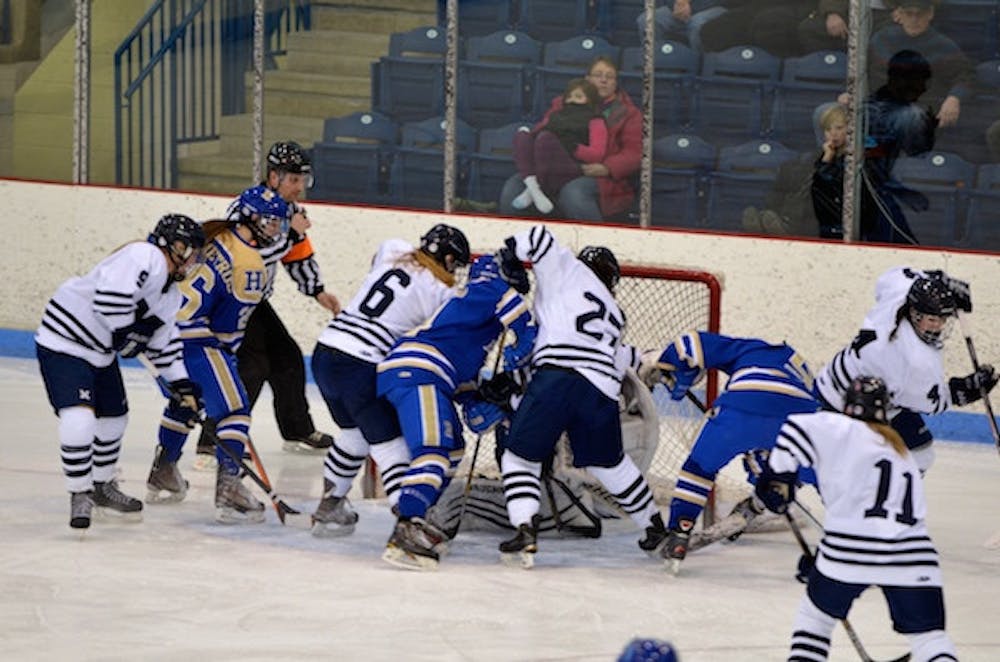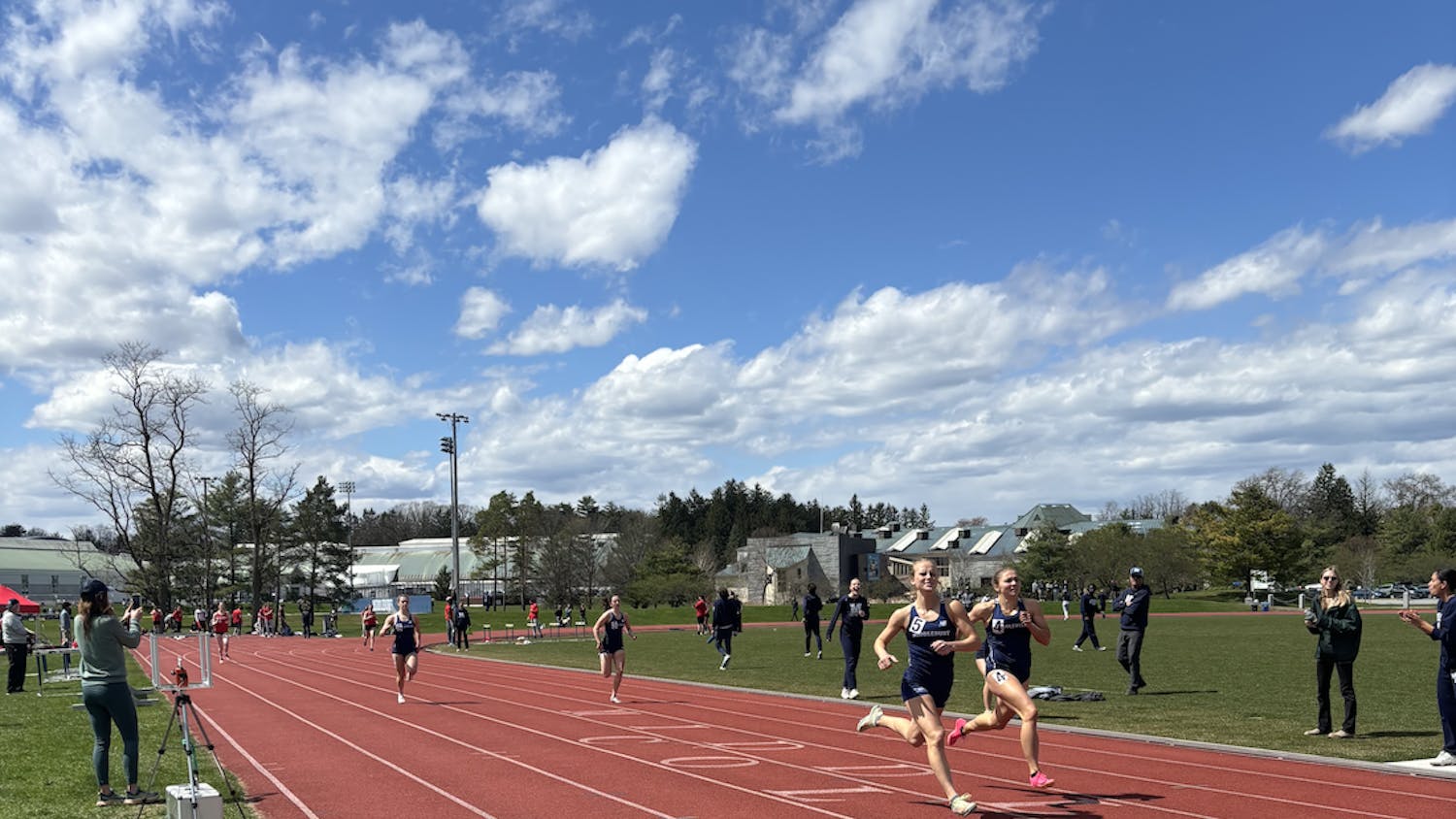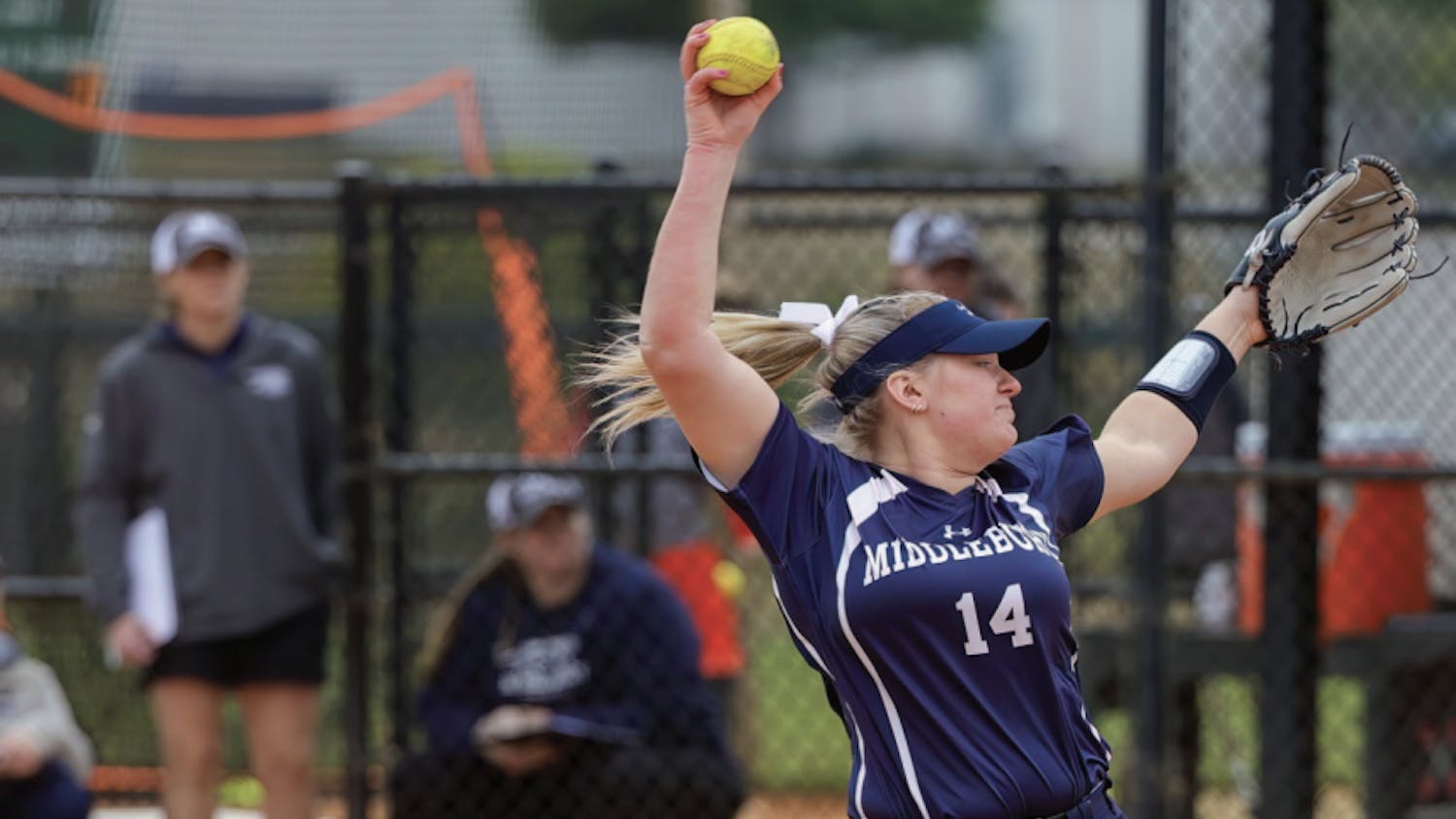Emily Fluke ’15 has scored 18 goals during the 2014-2015 season, but the most recent was also the biggest: a rebound that she shot past Hamilton goalkeeper Sam Walther in the 127th minute of play in NESCAC women’s hockey quarterfinal action on Saturday, March 28. Fluke’s goal sent the Panthers on to the conference semifinals and also earned Middlebury coach Bill Mandigo the 500th win of his storied career.
For the second consecutive year, the Panthers earned the top seed in the NESCAC tournament by virtue of having the best record in conference regular season play. Last year, however, Middlebury was unable to capitalize on the opportunity, falling 2-1 to an eighth-seeded Connecticut College team in what would be their final game of the 2013-2014 season.
The memory of last year’s upset was hanging in the air as Middlebury took to the ice Saturday in Kenyon Arena against another eight seed, the Hamilton Continentals. As the conference’s top team and the third-ranked squad in the country, the Panthers could expect nothing less than their opponents’ best games for the duration of the tournament.
Middlebury played like the clearly superior team during the early minutes against Hamilton, grabbing the lead in just the 52nd second of play on a score from first-year phenom Jessica Young ’18. Young’s goal was assisted by Janka Hlinka ’18 and Fluke. After a tripping call went against the Continentals, Young buried the puck in the net for the second time – this one a power-play goal with assists from Carly Watson ’17 and Hannah Bielawski ’15 – and the Panthers found themselves with a 2-0 lead less than five minutes into the game.
After the scoreboard remained unchanged for the rest of the first period, Hamilton cut the lead to one in the third minute of the second period on a goal from Katie Parkman. While the Panthers continued to pour shots on the Continental goal – forcing Walther to stop 16 shots in the second period alone – they could not break through to add an insurance goal. A brief six-on-four opportunity in the period’s closing minute elapsed without a score, and Middlebury took their 2-1 lead into the final period of regulation.
That lead would not last. After Hlinka was flagged for tripping in the eighth minute of the final period, Hamilton’s Teal Gosselin fired the puck past Panther goalkeeper Maddie Marsh ’15 for the crucial tying goal. Twelve more Middlebury shots in the period would not find their mark, and the game moved to sudden-death overtime with the teams tied at two.
By the end of regulation, Walther had already racked up 38 saves to keep her team in the game even as they were outshot 40-19 by the Panthers.
Middlebury immediately took to the offensive zone in overtime. The Panthers kept the pressure on the Continental defense with their speed and aggressiveness, earning several scoring opportunities. No matter what they did, however, the Middlebury skaters could not solve the riddle of Walther’s goaltending, as the Hamilton senior put an end to several sequences that looked like they might result in the game-winning goal. The same held true in the second and third 20-minute overtime periods, as the Panthers fired an astonishing 28 shots on goal during those two periods but were denied time and time again by Walther.
As the length of the game began to pile up into the triple digits, the skaters had essentially played an entire second game in overtime hockey. That fact – combined with the cutting intensity that followed from over 60 minutes of tense sudden-death play – meant that fatigue increasingly became a factor in the game. As her players looked more and more sluggish, Hamilton coach Emily McNamara deviated from her tactic of playing fewer players in line rotations, emptying her bench in an effort to get fresh legs on the ice.
Four minutes into the fourth overtime period, the Panthers finally got the opportunity they had been seeking for over two hours of play: Continental Kate Parkman went to the box for body checking, giving Middlebury the power-play opportunity that resulted in Fluke’s game-winning goal.
By the final buzzer, the Panthers had poured an astounding 83 shots on the Hamilton goal, with Walther stopping all but three. The final tally of 80 saves for the Continental goalkeeper is well beyond the former NESCAC tournament record of 66. At more than 126 minutes, the game is also the longest in the history of the tournament.
Marsh, meanwhile, had a relatively easy job on the other end, recording 31 saves on 33 shots faced in the win.
The win was also the 500th in the 27-year career of Panther coach Bill Mandigo, who becomes the first women’s hockey coach in any NCAA division to reach that benchmark.
For the Panthers, the quarterfinal victory sends the team on to the NESCAC semifinals, in which they will face fifth-seed Bowdoin – overtime winners over Connecticut College – on Saturday, March 7 in Kenyon Arena. If they can get past the Camels, the Panthers will have home ice to their advantage during Sunday’s conference championship game.
To the relief of Panther hockey fans, the team has now advanced farther than last year, and will look to bury that unfortunate memory of last year even further as they forge onward in their quest to return to national contention after an uncharacteristic absence from the national tournament a year ago.




